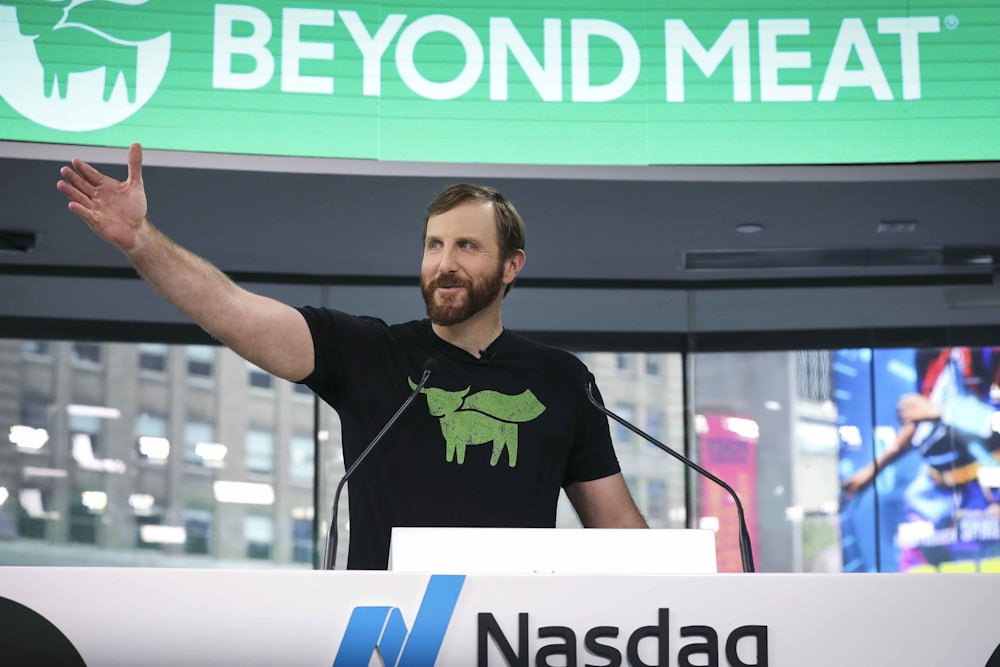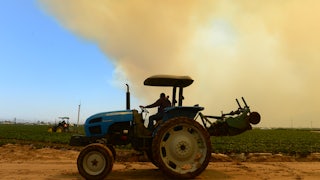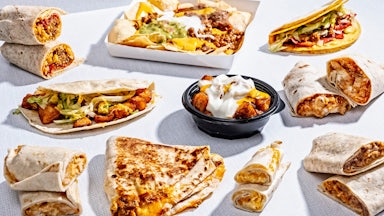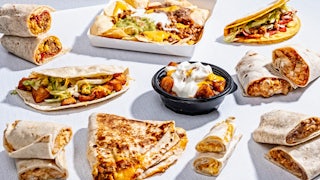The plant-based meat industry has stumbled. When Beyond Meat released its plant-based “steak tips” last week, it did so still reeling from a $97 million net loss in the second quarter; staff layoffs are planned before the end of the year. That’s consistent with a Deloitte study released late September that found that, industry-wide, sales of “alternative proteins” had stalled and begun to backslide in 2021 and 2022. Even while a leveling off was predictable after a year of explosive growth, the report ventures a more ominous conclusion: The demand for alternative proteins may have already hit a ceiling in the United States.
Normally, this would be little more than bad news for investors. But this particular industry is also widely viewed as a lever to curb climate change and other ecological calamities. The scientific consensus suggests our current and projected levels of global meat production are not just unsustainable but apocalyptic. Along with being a significant methane and carbon dioxide emitter, the modern meat supply chain is at the center of a cluster of global risks, increasing the likelihood of zoonotic pandemics, driving deforestation that destroys our last remaining carbon sinks, and weakening the power of our antibiotics. Secondary perhaps only to oil infrastructure in its shocking toll on the global environment, the huge and growing industrial meat system has to be stopped in its tracks and rolled back—fast.
We need to stop thinking alternative proteins can stall the meat machine. In recent years, mainstream commentators, think tanks, legacy media, and consulting firms have narrated the development of alt-proteins as a similar story to the early days of renewable energy—as if simply funding research and investment in renewables will trigger a market revolution that does all the hard work for us. Energy activists these days have no trouble understanding that boosting renewables alone won’t cut it: Unless oil and gas production and expansion are stopped, fossil fuel consumption will continue. When will the meat conversation advance to this enlightened stage? We can expect the establishment to tell us that the path to salvation is paved by consumption. But this narrative hasn’t received significant pushback, whether from activists or from academics concerned with the environment, food, or animal welfare, many of whom have joined in cheering on the new business.
Although solar power has become cheap and plentiful in recent years, prior investment, corporate actors, infrastructure, and political power have interfered with the logic of efficiency. The business-led transition to clean energy isn’t happening—at least, not nearly fast enough. The electric car transition tells a similar story. We’re going to need limits on fossil fuel emissions and an intentional phaseout of their machinery.
For meat alternatives, the prognosis is more dire. The thinking goes that by virtue of their (eventual) cheapness, alternative meats can elbow out their incumbents. But this misunderstands how growth fuels itself, especially while meat distribution continues to globalize and a large chunk of U.S. production is exported. If demand for meat decreases, thanks to the presence of alternatives, the superproductive meat complex won’t slow down: For a global, diversified, vertically integrated meat conglomerate like JBS or Cargill, these might be minor problems to deal with, but they don’t inherently challenge the profitability of meat. Even if meat imitations win the race to the bottom on price—something most plant burgers are not currently in any danger of doing—it won’t counteract the astonishing cheapness of today’s meat, consumption of which will remain strong due to the inertia of its gargantuan production system and the continual affordability and ubiquity of its output. In an expanding global market, new products are not so much competitive as they are additive.
Even with alternative proteins innovating by the day, they stand a better chance of doing nothing, at the global meat industry scale, than they do of helping. Powerful and enforced regulation and supply management can close down slaughterhouses; new products can’t.
Instead of frantically promoting alternative proteins in the hope that we can avoid asking people to sacrifice, activism and organizing should unapologetically contend with the fact that meat production must decline—and then try to make it decline, first by halting its expansion and then by carefully shrinking it to sustainable levels. Like the myriad efforts to halt the proliferation of fossil fuel infrastructure, techniques and opportunities for rhetoric and action abound. But the goal has to be clear. If we don’t manage how much meat we produce, then disease and disaster will manage it with chaos.
The bloom and burst of the narrative bubble around alt-protein was in part created by reckless predictions from the investors and advocates who stood to profit from the hype. Animal welfare organization the Good Food Institute took it upon itself to staff a global army of lobbyists to hawk the sensational promise of alternative proteins, which is an easy sell. It’s an orgy of win-wins for any government: economic growth, profitable patents, and positive environmental P.R. The narrative was comfortable and believable, even if no evidence suggested these products could actually trigger a voluntary consumer revolution.
It may strike some as counterproductive to spend time dismissing solutions like alt-protein that, while not terribly promising, probably can’t hurt. Alternative protein advocates and investors often make this point, saying they’re not presenting imitation meats as a “silver bullet” but rather as a tool in a multipronged, rising-tide-lifts-all-boats approach.
But what if we’re not actually on the same team, here, despite sharing goals? Stopping the production of extractive and harmful products (be they fossil fuels or meat) requires an entirely different strategy than promoting alternatives does, and these can be in conflict. Of course movements should be asked to “walk and chew gum at the same time”—but at points that may not be possible.
As the climate crisis accelerates, the best analogy may be the most common and literal: that of a house on fire. If the fire is never put out, there is no house to rebuild. If you are not actively putting out the fire, you are adding to it. And that’s especially true if the fire is being caused in part by economic growth itself, rather than the particular impacts of certain commodities. Alt-protein boosterism is, fundamentally, a capital- and capitalism-friendly approach—something more people should be skeptical of at this point.
There’s another reason to question this approach. Despite the ubiquitous comparison of alt-proteins to renewables, Impossible burgers are different from solar panels. When you turn on your lights, you won’t notice who or what supplied the power. Not so for the food on one’s plate. This conflation is commonplace, especially among vegan and vegetarian advocates who think “taste” and “texture” can simply be engineered and that meat is a moral and sensory repugnance. Meat has cultural value in many societies; people don’t only love it because they love sin or violence or blood or patriarchy. Consumption of meat must decrease—like the rest of Western consumption. But assuming that it should actually disappear, largely to be replaced by alt-proteins, is the sort of thesis advanced by those who don’t have much sympathy for meat-eating in the first place. Rather than avoiding the problem of culture (and meat’s place in it), alt-protein boosters are promoting technoculture, expecting the world to accept it for moral reasons and to smile while chewing.
So what’s the alternative? Unlike oil, there is no finite supply of farm animals; they are easy to reproduce. Land is finite, but grain is plentiful, and animals are being stored in skyscrapers. People don’t want to eat less meat or be told what to eat. Everyone knows the political headwinds here are strong. Alternative protein advocates more or less capitulate to this sense of political hopelessness—it’s why they suggest giving people an expanded choice of what to eat rather than focusing on reduction.
But this only perpetuates the problem. We need better rhetoric about contracting supply, deliberately. We have to start shutting down factory farms like they’re coal plants and crude oil pipelines, and ultimately ration production. We should justify these rations on the grounds of humanity’s survival. At the moment, these proposals are unthinkable at the level of mainstream politics. So the primary task at hand is to think and articulate them.
Right now, our food system’s anarchic overproduction and desperate pursuit of food export markets is a strategy developed and underwritten by the U.S. government. Pretending the market for food is a free market is one of the most pernicious lies in American public life. We are deeply invested in our food system as taxpayers. Agricultural policy is one of the most lobbied and obstructed legislative arenas. But more powerful—and fragile—than its shovelfuls of government cash is agriculture’s near-total exclusion from regulation and oversight. The Environmental Protection Agency, the Agriculture Department, the White House, Congress—all can begin to limit livestock production today. There are numerous legal levers and pretexts for it. Big Meat knows this, but the public largely doesn’t.
Americans consume absurd quantities of meat. Do we do this joyfully and willingly? A third of us have recently begun to eat less of it. Could we imagine a future in which we collectively accept a smaller supply, especially since surveys also show that increasing awareness of the unsustainability of our lifestyles is causing widespread anxiety and despair? While talk of reducing meat consumption prompts intense anger and chauvinism in some corners, could it feel, to many, like an unburdening, a relief of guilt that empty consumption can’t cure? Especially if it meant that the meat we got was produced more responsibly and from entities we could better trust and recognize?
To stop consuming world-ending quantities of meat, we have to limit its production. And to do that we have to start talking about it. Unlike consumer goods, narratives—that no sacrifice is necessary, that the market can save us—can more easily displace each other. It’s time to distinguish convenient beliefs from inconvenient truths and work to change our common sense of what’s possible, rather than capitulate to suicidal optimism.






